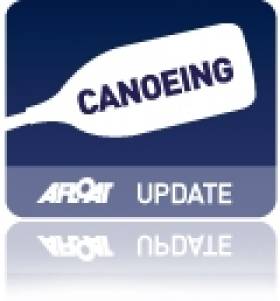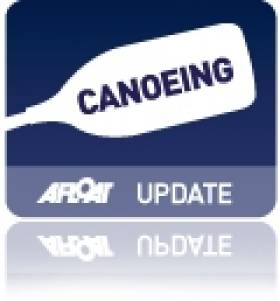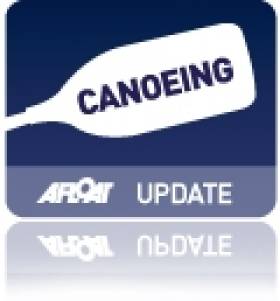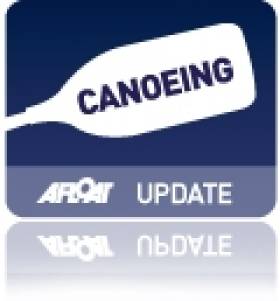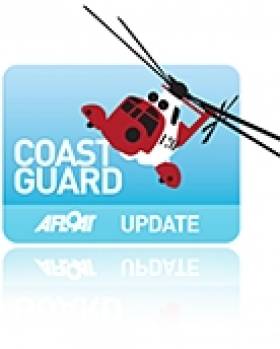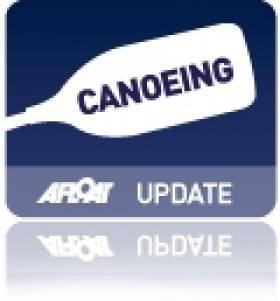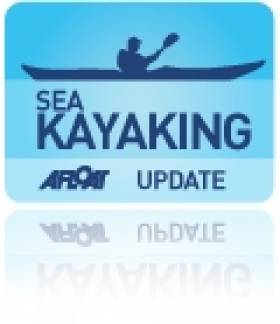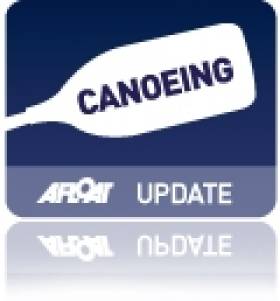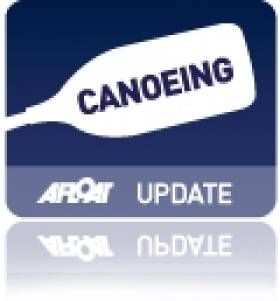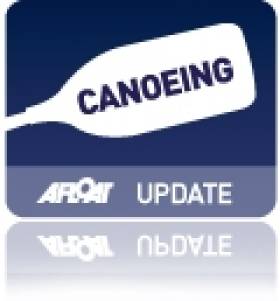Displaying items by tag: canoe
European Canoe Semi-Final Spot for Ireland's Jezierski
#CANOEING: Ireland’s Andrzej Jezierski took fourth place in his heat of the C1 200 metres at the European Canoe Sprint Championships in Brandenburg in Germany today. He will compete in tomorrow’s semi-finals.
Barry Watkins and Michael Fitzsimons competed in the semi-finals of the K2 1,000 metres. Their fourth-place finish left them just .3 of a second off a final place.
Canoe Sprint European Championships (Selected Results; Irish interest)
Men,
K2 1,000 metres: Heat One: 5 M Fitzsimons, B Watkins 3:17.038. Semi-Final: 4 Fitzsimons/Watkins 3:19.812.
C1 200 metres – Heat One: 4 A Jezierski 41.598 seconds.
Jezierski Misses Chance By Trying Too Hard to Start Fast
#CANOE SPRINT: Andrzej Jezierski’s challenge in the semi-finals of the Canoe Sprint World Cup in Szeged, Hungary ended before it began. The Ireland competitor first had a false start and then, straining to get an edge second time around, he fell in just before the race was due to begin. He was disqualified and the race went off without him. Jenny Egan finished ninth in the women’s K1 200 metres semi-final and Peter Egan and Simas Dobrovolskis filled the same position in the K2 200m semi-final.
Canoe Sprint World Cup, Szeged, Hungary (Irish interest)
Men
C1 200m – Heat One: 1 Russia (A Korovashkov) 41.746, 2 Kazakhstan (M Medetov) 43.888, 3 Ireland (A Jezierski) 43:978. Semi-Final One: Jezierski disqualified.
K1 500m – Heat One: 6 B Watkins. Semi-Final Three: 3 Watkins.
K1 1,000m – Heat Four: 7 B Watkins. Semi-Final Two: 8 Watkins.
K2 200m – Heat Four: 6 P Egan, S Dobrovolskis.
Women
K1 200 – Heat One: 7 J Egan. Semi-Final: 9 Egan.
K1 500 – Heat One: 7 J Egan. Heat Two: 7 J Burke. Semi-Final Two: 8 Burke. Semi-Final Four: 9 Egan.
K1 1,000 – Heat One: 4 J Burke.
Canoeist Liam Jegou Takes World Championship Silver
#CANOEING: Ireland junior canoeist Liam Jegou took a silver medal today at the Canoe Slalom Under-23 and Junior World Championships in Sydney, Australia. On a difficult course in Penrith, only Florian Breuer of Germany was faster in the C1 (canoe single) than the Irishman. Both men took one touch, Jegou’s on the fourth gate. Roman Malyshev of Russia was third and Britain’s Samuel Ibbotson fourth.
“It’s great, I am really happy,” Jegou said. He had come close to a podium finish in the last two years, finishing sixth last year and fourth in 2012.
Canoe Slalom World Under-23 and Junior Championships, Penrith, Sydney (Irish interest):
C1 Men – Semi-Final (10 qualify): 1 Britain (S Ibbotson) 109.47; 6 Ireland (L Jegou) 112.11 (2.64 behind). Final: 1 Germany (F Breuer) 104.31, 2 Ireland (L Jegou) 107.61, 3 Russia (R Malyshev) 108.54.
Canoeist Liam Jegou Fastest in Junior World Heats
#CANOEING: Liam Jegou recorded the fastest heat time as he won his heat at the Canoe Slalom Junior World Championships in Sydney in Australia. Jegou, competing in a the C1 class, took 101.66 seconds to complete the course, .97 of a second ahead of Samuel Ibbotson of Britain. Jegou lived in Ireland until he was seven, when his family moved to France. He came into the Ireland system in 2010 and finished sixth in last year’s Junior World Championships and fourth in 2012.
Canadian Canoes Swamped Crossing Strangford Lough
#canoe – An overnight trip to Salt Island ended prematurely when five Canadian canoes were swamped by waves as they crossed Strangford Lough in Northern Ireland.
At just after 12 noon a member of the public called 999 to report that two kayaks were in difficulty north of Green Island and there were people in the water. Belfast Maritime Rescue Coordination Centre sent the Coastguard Rescue Teams based in Portaferry and Bangor to the Lough with the RNLI Lifeboat based in Portaferry. Dive Rhib Nemo also joined the rescue.
Seven canoeists from a party of 14 were pulled from the water. All 4 adults and 10 teenagers were taken to the shore by the two boats where they received medical attention.
Jude McNeice Belfast MRCC Watch Manager said:
"The group were equipped with lifejackets and safety helmets but obviously weren't expecting to spend time in the cold water.
"Although the sun is shining the wind is blowing and so conditions on the Lough are quote rough. I'd just like to take this opportunity to remind anyone planning to enjoy the spring weather to check weather forecasts and tidal conditions before you set out."
RNLI add:
The call for help was made at 12.05pm and the lifeboat was launched four minutes later. Arriving on scene the lifeboat crew immediately went to the aid of the four kayakers in the water. They recovered them onto the lifeboat and also took a further nine onboard from their kayaks. The remaining group had tied their kayaks together to prevent them from drifting further. The group was made up of three adults and eleven teenagers.
One of the adults stayed with the kayaks while the lifeboat crew returned with the rescued group to Killyleagh pier. They were met by a waiting ambulance, which had been requested when it was learned there were casualties in the water.
Commenting on the callout Portaferry RNLI Lifeboat Operations Manager Brian Bailie said, "This was a very successful rescue for the lifeboat crew who arrived on scene minutes after the alarm was raised. To take such a large number of casualties to safety is a testament to their training and skill. We are delighted that everyone is safe and well.
'The group were all wearing floatation devices and helmets. The priority of the volunteer lifeboat crew from the outset was to take the four people from the water first and get them warm. Conditions were fresh with a strong wind blowing across the lough and the group could have quickly been blown in different directions."
When the lifeboat crew had safety landed the casualties on the pier, one of the crew stayed with the group while the remaining lifeboat crew went out to recover the kayaks.
Olympic Canoeist Eoin Rheinisch Bows Out
#CANOEING: Eoin Rheinisch, a three time Ireland Olympian in canoe slalom, has retired.
In a statement, the Kildare man looked back over his career.
In 1996, I watched the Atlanta Olympics with my brothers at our home in Leixlip. Inspired by my sporting heroes expertly negotiating the coloured poles hanging down over the heaving white water, I made a decision that would shape the rest of my life. I wanted to represent Ireland at an Olympic Games. The past 18 years of chasing that dream - and other related goals - have been an incredible experience but the time has come for me to move on to the next chapter of my life.
I have given the decision to retire much thought and it is not an easy thing to do. I also considered allowing retirement to drift past unannounced. But I wanted to highlight what sport has done for me and thank all of the wonderful people that have helped me throughout my career.
During the incredible 90 seconds of a slalom race, I am on my own to face down those coloured poles and heaving water. But the preparation to reach that stage has involved commitment and support from sporting bodies and countless individuals at every stage of my career. This has been an all-consuming pursuit involving full-time training and travel outside of Ireland for more than 200 days a year.
That type of commitment would not have been possible without the support of the Irish Sports Council, Irish Institute of Sport, Olympic Council of Ireland, Canoeing Ireland and the various private sponsors that have believed in me.
Over the years, my sporting idols have changed but my real deserved heroes are my parents, brothers, close friends and partner. This career choice and what it involves can often be a selfish pursuit and, despite this, they have always been there for me no matter how bad the outlook is. I don't say it often enough ... "thank you".
I have been so fortunate to have the gift of good health that has allowed me to have such a long sporting career. My parents, my own injuries and illnesses along the way have taught me to never take this gift for granted. Representing Ireland at three Olympic Games has been an honour and a privilege. Finishing 4th in Beijing was a standout moment. Coming through under extreme pressure is one of the most exhilarating feelings I know. My own personal highlight was winning a World Cup in Spain during the selection process for the Athens Olympics.
Every highlight had plenty of accompanying lows, which were a necessary part of my development. Overcoming obstacles and responding well to dips in performance have helped shape the type of person I am today.
I am still involved in high-performance sport thanks to the education provided by the Institute's Pursuit of Excellence Programme. I want to pass my experience on to the current crop of junior and under 23 athletes and have already started working with them. I have no doubt that future Olympians will emerge from this inspirational group of youngsters.
I am sure there are even more challenges in the future and I hope to use both my sporting experience and formal education, including a degree in Business and Marketing, as I face them down.
Karl Dunne of Canoeing Ireland said: "Eoin has been a great ambassador for the sport of canoeing throughout his career, my overriding impression of Eoin has always been one of professionalism. While he may be hanging up his competitor paddles, Canoeing Ireland are delighted that there is real legacy in Eoin taking up the position as National Coach to the U23 and Junior Canoe Slalom Squads. For the first time in the organisations history we have a true home grown high performance coach . On behalf of all at Canoeing Ireland, I wish Eoin the very best of luck as he moves from the water to the riverbank".
Pat Hickey, President Olympic Council of Ireland and IOC executive Member, said: "Eoin has been a great ambassador for canoeing and for Olympism. I followed his career with interest since he first came to our attention and his 4th place at the Beijing Olympic Games is just one of the many highlights along the way. His training, preparation and attitude has always been most professional and he is a terrific role model for the next generation. I wish him well for the future".
John Treacy, CEO, Irish Sports Council, added: "Eoin is one of the outstanding Irish athletes of his generation. He has had a great career, one we were proud to support. More than that, he is a true gentleman and has always been a pleasure to work with, a professional in every aspect of his preparation and performance. On behalf of the Council I want to wish him well in his retirement from international sport".
Eoin Rheinisch's Main Achievements:
· 3 Time Irish Olympian – Athens 2004, Beijing 2008, London 2012.
· 4th Place at the Beijing Olympics
· World Cup Gold Medallist – La Seu D'Urgell, Spain.
· European and World Championship Finalist.
· 7 Time World Cup Finalist
Mark Your Canoe or Kayak for Safety Purposes
HM Coastguard dealt with 578 incidents involving canoes and kayaks in 2012. Sadly, there were nine fatalities.
The type of call outs ranged from falling in to the water, fighting with strong winds and rip tides, to a lack of survival equipment. But another key issue is canoes or kayaks that have been found drifting at sea or abandoned on shore. Coastguards often spend valuable time tracking down the owners to check if they're safely ashore or actually in trouble at sea. This occasionally involves a large-scale search and rescue mission, involving coastguard rescue teams, lifeboats and even search and rescue helicopters.
HM Coastguard has now produced a free ID sticker which owners can use to write their contact details on and stick on their canoe or kayak.
Anne Young, HM Coastguard's National Liaison Officer for canoes and kayaks, says:
"We recommend that you clearly mark your canoe or kayak with your name and contact details so that if it is lost, stolen or abandoned we can contact you to make sure that you are safe. This will save a lot of time, and could give us extra information we need to help you if we believe you're in difficulty at sea.
"The new stickers are very easy to use. Just write your contact details onto the paper side, stick the laminate over the top and stick onto your canoe or kayak.
"For canoeists and kayakers, our other safety advice is to wear a buoyancy aid and make sure you carry a VHF radio, so you can contact the Coastguard on channel 16 if you get into difficulty. A Personal Locator Beacon ( PLB) is also a good idea for more remote locations, so an accurate position of where you are can be sent direct to the Coastguard. And remember to tell a shore contact where you are going and when you expect to return so that they can contact us if you do not come home as expected."
Egan and Simmons Fastest In Liffey Descent
#LiffeyDescent: Peter Egan and Jon Simmons won a long battle with Déaglán Ó Drisceoil and Tom Brennan to come home fastest in the Liffey Descent today. The two crews were the only to come in under two hours in a race made difficult by shallow water. There were dramatic capsizes and crashes at the start, and crews struggled with damage to their rudders. Because of the dry weather, the ESB could release not much more than half their usual flood.
The fastest K1 home was piloted by Dermot Hudson. Tomas Jerek of the Czech Republic pushed him hard, but capsized and had to recover.
Jenny Egan and another Czech paddler, Martin Kolanda, won the mixed K2, while Gary Mawer won the Masters K1.
Ireland Canoeists Lose Time on Portages at World Championships
#CanoeMarathon2013: Ireland’s Jenny Egan and Peter Egan finished 15th and 19th respectively at the Canoe Marathon World Championships at Lake Bagsværd, Denmark, today. Jenny Egan started promisingly but was knocked back by her performances on the portages.
Peter Egan was generally faster on his portages on his paddle, but did lose control of his boat on one and lost time.
Last year, in Rome, Peter Egan finished 17th and Jenny Egan 16th.
Canoe Marathon World Championships, Lake Bagsværd, Denmark (Irish Interest, Selected Results)
Men, K1 (30.1 km): 1 H McGregor (South Africa) 2 hourse 10 mins 34 seconds; 19 P Egan (Ireland) 2:15.26.
Women, K (25.8 km) 1: R Csay (Hungary) 2:01.26; 15 J Egan (Ireland) 2:09.23.
Ireland Canoeist Rheinisch Starts Well in Tacen World Cup
#CanoeSlalomTacen: Eoin Rheinisch started well at the Canoe Slalom World Cup in Tacen this morning. The Ireland paddler had a clear first run in a time of 102.21, placing him fourth in the K1 competition at this very early stage. Ciarán Heurteau was judged to have had a touch at gate four, adding a two-second penatly to his time of 104.77, and leaving him down the rankings. Patrick Hynes had a run of 123.17, including 10 seconds in penalties. The second run is due later today.


























